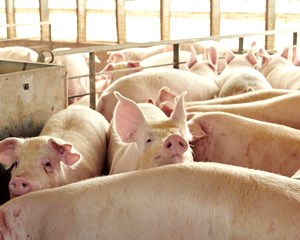United States
美國(guó)版塊
Animal welfare
動(dòng)物福利
The bacon crunch
培根要短缺了
California's new regulations may raise the price of pork
加州的新規(guī)定將推高豬肉價(jià)格
Bringing home the bacon is about to get harder in California. Proposition 12, a ballot initiative passed in 2018, prevents the pork, veal and egg industries from raising animals within confined spaces for all products sold within the state. And while the egg and veal industries met new rules in 2020 (43 square feet, or 13 square metres, per calf raised for veal, one square foot per egglaying hen), the pork industry may fail to meet the requirements for breeding pigs (24 square feet) by January 1st.
在加州,吃到培根(養(yǎng)家糊口)將變得越來(lái)越困難。第12號(hào)提案是2018年通過(guò)的一項(xiàng)投票倡議,該提案規(guī)定只要你在加州銷售豬肉、小牛肉和雞蛋行業(yè)產(chǎn)品,那產(chǎn)出這些產(chǎn)品的飼養(yǎng)動(dòng)物就不得被限制在有限的空間里。盡管雞蛋和小牛肉行業(yè)在2020年達(dá)到了新規(guī)定(每頭小牛43平方英尺或13平方米,每只母雞1平方英尺),但豬肉行業(yè)可能在1月1日之前無(wú)法滿足種豬(24平方英尺)的要求。
California's new restrictions are part of a larger movement to release animals from cages. McDonald's, Kellogg's, Kroger's and other businesses announced plans to use only cage-free eggs by 2025. Eight states, including Massachusetts and Utah, passed laws that in effect ban eggs produced by caged hens. California's law is the most impactful on the pork industry. As the largest consumer of pig products, 116m kilos per year (about 15% of all produced in America), California's standards have weight elsewhere.
加州的這一新限制是為將動(dòng)物從籠子里解放而發(fā)起的更大的運(yùn)動(dòng)的一部分。麥當(dāng)勞、家樂(lè)氏、克羅格和其他企業(yè)宣布,計(jì)劃到2025年只使用散養(yǎng)雞蛋。包括馬薩諸塞州和猶他州在內(nèi)的八個(gè)州通過(guò)了實(shí)際上禁止了籠養(yǎng)母雞產(chǎn)蛋的法律。加州的法律對(duì)豬肉行業(yè)影響最大。作為最大的生豬產(chǎn)品消費(fèi)國(guó),加州每年生產(chǎn)1.16億公斤生豬產(chǎn)品(約占美國(guó)生豬產(chǎn)品總量的15%),其標(biāo)準(zhǔn)在其他地方也有分量。

The industry is, naturally, claiming that the law is unconstitutional. So far, challenges have been unsuccessful. The us Court of Appeals for the Ninth Circuit declined the National Pork Producers Council (NPPC) and American Farm Bureau Federation's petition to strike down the law in July. And the Supreme Court denied a petition filed by the North American Meat Institute a month earlier.
該行業(yè)自然會(huì)聲稱該法律違憲。到目前為止,這些挑戰(zhàn)都沒(méi)有成功。美國(guó)第九巡回上訴法院拒絕了國(guó)家豬肉生產(chǎn)者委員會(huì)(NPPC)和美國(guó)農(nóng)場(chǎng)局聯(lián)合會(huì)在7月提出的廢除該法律的請(qǐng)求。最高法院駁回了北美肉類協(xié)會(huì)一個(gè)月前提交的一份請(qǐng)?jiān)笗?/p>
Michael Formica, general counsel at the NPPC, says that the new law places an unreasonable burden on pork producers. Currently breeding pigs, which typically weigh about 225 kilograms, are placed in 14-square-foot gestation crates. Less than 4% of all sow housing meets the new standards, according to Rabobank, which finances agriculture.
NPPC的總法律顧問(wèn)邁克爾·福米卡說(shuō),新法律給豬肉生產(chǎn)商帶來(lái)了不合理的負(fù)擔(dān)。目前,約225公斤重的種豬要放在14平方英尺的妊娠箱中。據(jù)資助農(nóng)業(yè)的荷蘭合作銀行(Rabobank)稱,只有不到4%的母豬養(yǎng)殖場(chǎng)符合新標(biāo)準(zhǔn)。
Activists blame the pork industry. "(They) had three years to change their housing systems. They instead chose to not comply," says Chris Green of Harvard Law's Animal Law and Policy Programme. Californians could pay the price. The Hatamiya Group, a consulting firm hired by opponents of the law, estimate that consumers could pay up to 60% more: a $6 pack of bacon could now cost $9.60. Bacon smugglers in Nevada are, presumably, licking their lips.
活動(dòng)人士指責(zé)豬肉行業(yè)。“(他們)有三年時(shí)間來(lái)改變他們的住房體系,但他們反而選擇不遵守,”哈佛法學(xué)院動(dòng)物法律和政策項(xiàng)目的克里斯·格林說(shuō)。加州人可能會(huì)為此付出代價(jià)。該法律的反對(duì)者雇傭的咨詢公司Hatamiya Group估計(jì),消費(fèi)者可能要多支付60%的費(fèi)用:一盒6美元的培根現(xiàn)在要9.6美元。據(jù)推測(cè),內(nèi)華達(dá)州的培根走私者正等著數(shù)錢。
譯文由可可原創(chuàng),僅供學(xué)習(xí)交流使用,未經(jīng)許可請(qǐng)勿轉(zhuǎn)載。











